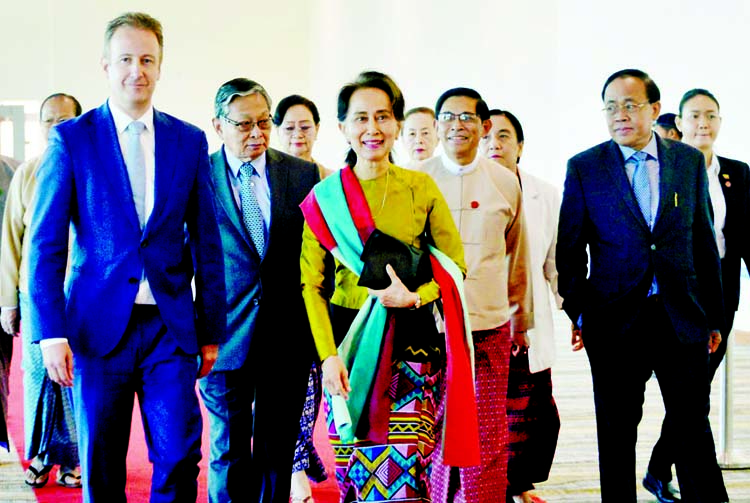
News Desk :
The International Court of Justice (ICJ) will start its three-day hearing on the Rohingya genocide case against the Myanmar from Tuesday.
Gambia, a Muslim West African country, filed a lawsuit in November accusing Myanmar of genocide, the most serious international crime, against its Muslim population in 2017, driving around 740,000 into neighboring Bangladesh.
In the rate legal battle, Myanmar’s state counsellor and Nobel peace prize winner Aung San Suu Kyi will appear in person at the UN top court in the Hague to defend Myanmar against accusations of genocide.
Gambia Attorney General and Justice Minister Abubacarr Marie Tambadou and Myanmar State Counsellor Aung San Suu Kyi will lead the lawyers on behalf of their respective countries during the December 10-12 hearing at the ICJ.
Over 120 international media outlets got registered to cover the three-day hearing.
A 20-member Bangladesh delegation, led by Foreign Secretary M Shahidul Haque, is scheduled to leave for The Hague Sunday night, an anonymous foreign ministry official told The New Nation.
Prof Imtiaz Ahmed of Dhaka University’s international relations department is also among the Bangladesh delegation members.
“The delegation will observe the hearing at the UN’s top court. It will also hold meetings with stakeholders,” he added.
The official also said that a minister-level delegation from Canada would also be there during the hearing.
Bangladesh and Canada are working closely on the Rohingya issue, officials said.Another foreign ministry official said that Suu Kyi will make her statement at the Court on Wednesday
The Gambia, which lodged the case on behalf of the Organization of Islamic Cooperation (OIC), brought the claim that Myanmar’s military carried out mass murder, rape and destruction of Rohingya Muslim communities.
During the three-day hearing, the Gambia will urge the court to make an emergency declaration that Myanmar must halt a continuing genocide, and the court will consider whether it has jurisdiction and whether there is a plausible case to answer.
The Gambia’s submission states: “The genocidal acts committed during these operations were intended to destroy the Rohingya as a group, in whole or in part, by the use of mass murder, rape and other forms of sexual violence, as well as the systematic destruction by fire of their villages, often with inhabitants locked inside burning houses.”
Its arguments rely on the findings of UN investigations that described “genocidal intent” in the crimes. The UN special rapporteur Yanghee Lee related first-hand accounts of “attacks in which homes were set ablaze by security forces, in many cases with people trapped inside, and entire villages razed to the ground”.
Bangladesh now shelters over 1.1 million Rohingyas. Most of them entered Cox’s Bazar since August 25, 2017 amid a military crackdown on Rohingyas in Rakhine.

